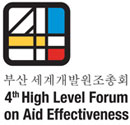 This is the second article in a series on the 4th High Level Forum on Aid Effectiveness. Last week’s article laid out why the HLF matters for conflict-affected and fragile states. Next week we’ll take a look at progress on the outcome document and what it will mean for progress in these contexts.
This is the second article in a series on the 4th High Level Forum on Aid Effectiveness. Last week’s article laid out why the HLF matters for conflict-affected and fragile states. Next week we’ll take a look at progress on the outcome document and what it will mean for progress in these contexts.
With just over one week to go before the 4th High Level Forum on Aid Effectiveness kicks off, plans are shaping up for the three meetings focused on fragile and conflict-affected states:
1) On the first day, which is devoted to presenting evidence-based insights, two panel sessions will discuss the findings of the recent monitoring report on the Principles for Good International Engagement in Fragile States and Situations.
2) On the second day, when the Ministerial plenary begins, a panel will be devoted to discussing the so-called New Deal for Engagement in Fragile States.
3) Also on day two, a side event will be dedicated to advancing the substance of the New Deal and what it all means–or will mean–at country level.
Key Conclusions
The dialogue concerning fragile and conflict-affected states has advanced remarkably over the past decade. Structured dialogues have been taking place between donors and affected countries with open conversations on the challenges and practical solutions to overcoming them. To date, however, most of these discussions have remained in the realm of development agencies and finance or planning ministries in fragile states.
Busan presents an important moment in which political leaders will enter into this conversation. Garnering this much attention to the issue of conflict-affected and fragile states in and of itself demonstrates significant progress. Committed leadership from fragile states themselves and significant engagement from donors means expectations are high in Busan to launch a real shift in how the international community support these most vulnerable countries.
Analysis
The second, and likely most important, session for fragile and conflict-affected states at Busan will be the ministerial session on the first day of Plenary. As described on the HLF4 website, the objective of this session (referred to as Building Blocks in the language of the HLF) is “to change the way national and international actors work in situations of fragility and conflict.” Specifically, the g7+, together with their donor counterparts under the umbrella of the International Dialogue on Peacebuilding and Statebuilding, will be putting forward a “New Deal for Engagement in Fragile States.” This document focuses on three main areas:
1) Support for five Peacebuilding and Statebuilding Goals (PSGs), including legitimate politics, security, justice, economic foundations and revenues and services;
2) Compacts as a means of prioritization and agreement between donors and partner countries; and
3) A change in the way business is done that will enhance this paradigmatic shift. A key take-away from this session will be Ministerial endorsement of this New Deal and the announcement of several countries participating as first-starters to demonstrate impact on the ground.
The final session of importance for those concerned with conflict and fragility will be a side event on the evening of the second day. This session will focus specifically on implementation of the New Deal. It will discuss the PSGs in more depth, including what they will mean on the ground. It will also discuss monitoring options and how to engage civil society. More fundamentally, this session should touch upon how donor modalities will need to adapt to this new framework, and, similarly, how fragile states will need to reform and enhance their own bureaucratic processes to support the PSG and associated commitments.
The Busan three-day lifespan will bring us through from evidence to policy to practice. Given the complexity of challenges facing fragile countries, a development approach is simply not enough. One cannot achieve security, development or sound political engagement without progress in all fronts.
While Busan demonstrates significant progress, it is still only a beginning. The real work will begin after delegates have packed their bags and gone back home. We have seen commitments signed in the past and not lived up to. Will donors really be able to agree to compacts in high-risk environments exactly at a time of belt tightening and budget limitations at home? And will governments in fragile and conflict-affected states be able to take up the leadership mantle that is needed and do it in a way that is broadly inclusive and representative? These and other questions will form the real proof of the success of Busan.




